How to Build a Personalized BPD Self-Care Plan with Therapy Tools
Introduction 🌸
Living with Borderline Personality Disorder (BPD) can feel overwhelming. The emotional highs and lows, fear of abandonment, impulsivity, and intense inner conflicts often leave individuals drained. While therapy is the cornerstone of treatment, healing doesn’t only happen in a therapist’s office. The most meaningful changes come when you personalize your self-care plan—one that integrates therapy tools into your everyday life.
A personalized self-care plan isn’t just about bubble baths and relaxation. It’s about creating daily structures, routines, and emotional safety nets that keep you grounded, resilient, and connected. When paired with therapy techniques, supplements 💊, and breathwork 🌬️, self-care becomes a tool for emotional regulation and recovery.
This article walks you step by step through building your own BPD self-care plan, covering therapy-based practices, supplements, breathwork, and practical daily strategies.
Looking for supplements for people with BPD? Click here.
Why a Self-Care Plan Is Essential for BPD ⚖️
Emotional Regulation
BPD often involves extreme difficulty managing emotions. A plan gives you tools to calm yourself in moments of overwhelm.
Consistency in Chaos
BPD is marked by instability. Having a plan introduces predictability and structure, which reduce anxiety.
Strengthening Therapy Progress
Therapy sessions are powerful, but integration happens at home. A self-care plan ensures skills are practiced daily.
Building Self-Trust
By following a personalized plan, you prove to yourself that you can meet your own needs and handle your emotions.
Step 1: Identify Your Core Needs 🌿
Before building a plan, reflect on what you need most. Common areas for BPD self-care include:
Emotional Regulation 🌬️ (managing highs and lows)
Relationship Support 💜 (navigating fears of abandonment)
Self-Soothing Skills 🎶 (calming the nervous system)
Identity Support 🌱 (grounding a sense of self)
Impulse Control 🎯 (reducing self-sabotaging behaviors)
Sleep & Rest 😴 (supporting nervous system recovery)
Ask yourself: Which of these areas feel most out of balance for me? That’s where your plan begins.
Step 2: Choose Therapy Tools for Daily Use 🛋️

Therapy provides the framework for your self-care. These evidence-based modalities offer practical tools:
DBT (Dialectical Behavior Therapy) 💬
Mindfulness: Stay present instead of getting lost in spirals.
Distress Tolerance: Tools for surviving emotional crises.
Emotion Regulation: Naming and managing emotions.
Interpersonal Effectiveness: Communicating without self-sabotage.
👉 Daily Practice Example: Use a DBT “STOP” skill before reacting impulsively.
CBT (Cognitive Behavioral Therapy) 🧠
Identify distorted thoughts.
Reframe them into balanced beliefs.
👉 Daily Practice Example: Write down one negative thought and challenge it with three alternatives.
EMDR (Eye Movement Desensitization & Reprocessing) 🌀
Trauma-focused therapy that processes painful memories.
At home, you can use bilateral stimulation (tapping each side of your body) to self-soothe.
👉 Daily Practice Example: Gentle tapping during overwhelming flashbacks.
Schema Therapy 🪞
Identifies core schemas like “I am unlovable.”
Uses reparenting techniques to build self-compassion.
👉 Daily Practice Example: Write yourself a supportive letter as if you were your own parent.
MBT (Mentalization-Based Therapy) 🤔
Builds the ability to see your own and others’ mental states clearly.
👉 Daily Practice Example: Before reacting, ask: “What else might this person be feeling?”
Somatic Practices 🧘
Body-focused therapies that release stored trauma.
Yoga, movement, or breathwork.
👉 Daily Practice Example: 5 minutes of gentle stretching or deep breathing before bed.
Looking for online therapy for people with BPD? Click Here.
Step 3: Layer in Supplements for Emotional Balance 💊
Supplements can support the brain and nervous system, helping you feel calmer and more stable.
Core Supplements for BPD
Omega-3s 🐟: Reduce impulsivity and mood swings.
Magnesium 🌌: Calms anxiety, supports sleep.
L-Theanine 🍵: Promotes calm focus.
Ashwagandha 🌱: Lowers cortisol.
Vitamin D ☀️: Supports mood and circadian rhythm.
Zinc ⚖️: Regulates dopamine, helps impulse control.
Probiotics 🦠: Improve gut-brain communication.
👉 Pro tip: Always consult with a professional before adding supplements, especially if you’re taking medications.
Looking for supplements for people with BPD? Click here.
Step 4: Add Breathwork for Nervous System Regulation 🌬️

Breathwork bridges therapy and supplements by directly calming the nervous system.
Simple Practices for BPD
Box Breathing 🟦: Inhale 4 – Hold 4 – Exhale 4 – Hold 4.
Use during emotional crises.
4-7-8 Breathing 🌙: Inhale 4 – Hold 7 – Exhale 8.
Best before bed to lower anxiety.
Coherent Breathing 🌊: Inhale 5 sec – Exhale 5 sec.
Builds long-term vagal tone.
Humming Breath 🎶: Exhale with a hum to stimulate the vagus nerve.
Want to try Breathwork? Click Here.
Step 5: Build Morning & Evening Rituals 🌞🌙
Rituals anchor your day and help you practice consistency.
Morning Ritual 🌞
Omega-3 + Vitamin D with breakfast.
5 minutes of Coherent Breathing.
Mindfulness journaling.
Evening Ritual 🌙
Magnesium + Ashwagandha.
Therapy reflection journaling (gratitude + self-compassion).
4-7-8 Breathing before bed.
Step 6: Crisis Toolkit ⚡
Your self-care plan needs tools for emotional emergencies.
Include:
Breathing exercises 🌬️
Magnesium or L-Theanine supplement 💊
Grounding object 🪨
DBT skill card 📋
Soothing music 🎶
Safe contact list 📱
Step 7: Make It Personal 🌈
A self-care plan only works if it reflects your unique needs. Ask yourself:
What time of day am I most vulnerable?
Do I need more support for sleep, impulsivity, or anxiety?
Which therapy tools feel natural to me?
Which supplements do I tolerate well?
A Daily Self-Care Plan Example 🕰️
Morning 🌞
Wake up with sunlight.
Supplements: Omega-3, Vitamin D, Probiotic.
Coherent Breathing (5 min).
Journaling intention for the day.
Afternoon 🌿
L-Theanine before stressful tasks.
DBT skill practice if triggered.
Movement break (walk, yoga).
Evening 🌙
Supplements: Magnesium, Ashwagandha, Glycine.
Therapy reflection journaling.
4-7-8 Breathing (10 min).
Gratitude list before sleep.
Crisis Moments ⚡
Box Breathing.
Magnesium for calm.
Call supportive contact.
Case Studies 👩👨
Case 1: Anna 🌸
Struggled with panic at night.
Added magnesium + 4-7-8 Breathing.
Slept more deeply and felt calmer.
Case 2: Daniel ⚡
Battled impulsivity in relationships.
Used Omega-3 + DBT STOP skill daily.
Experienced more control and less regret.
Case 3: Maria 🌙
Felt emotionally empty in mornings.
Began probiotics + morning journaling.
Reported lighter mood and more stability.
Challenges & Tips ⚠️
Consistency is hard: Start with 1–2 small rituals.
Avoid overwhelm: Add supplements gradually.
Triggers during reflection: Keep it short, focus on gratitude.
Be flexible: Adjust plan when life changes.
Long-Term Benefits 🌈
With consistent practice, a personalized BPD self-care plan brings:
Calmer mornings and evenings 🌞🌙
Fewer emotional crashes ⚖️
Better sleep 😴
Stronger therapy outcomes 🛋️
Improved self-trust and resilience 💜
Conclusion 💜
BPD self-care isn’t one-size-fits-all—it’s about personalization. By integrating therapy tools, supplements, and breathwork into daily rituals, you can create a structure that anchors you in safety, stability, and compassion.
Therapy tools build skills for emotional awareness.
Supplements strengthen the body’s foundation.
Breathwork regulates the nervous system.
Together, they form a self-care plan that empowers you not just to survive BPD, but to heal and thrive. 🌿✨
References 📚
Linehan, M. M. (2014). DBT Skills Training Manual. Guilford Press.
Porges, S. W. (2011). The Polyvagal Theory. Norton.
Shapiro, F. (2018). EMDR Therapy. Guilford Press.
Young, J., Klosko, J., & Weishaar, M. (2003). Schema Therapy: A Practitioner’s Guide.
Parker, G., et al. (2015). “Omega-3 supplementation and borderline personality disorder.” Psychiatry Research.
Murao, E., & Shimizu, E. (2021). “Magnesium in psychiatric disorders.” Nutrients.
Jerath, R., et al. (2015). “Physiology of long pranayamic breathing.” Medical Hypotheses.
Neff, K. (2011). Self-Compassion. HarperCollins.
Related Posts
-

How to Measure Your Emotional Growth Over Time
Emotional growth can’t be measured on a scale — but it can be tracked through awareness, regulation, and reflection. Learn how to monitor your emotional evolution using journaling, biofeedback, and science-backed metrics for real progress. 💫
-

The Connection Between Creativity and Resilience
Creativity and resilience share the same roots — adaptability, flexibility, and imagination. Learn how creative expression rewires your brain for strength, helping you transform stress into growth through neuroscience, art, and self-reflection. 🌿
-

Why Cycling Supplements May Improve Long-Term Resilience
Your body adapts to everything — even supplements. Discover why cycling your supplements helps prevent tolerance, boost energy naturally, and build lasting resilience by aligning with your body’s biological rhythms. 🌿
-

The Role of Biofeedback in Emotional Strength
Learn how biofeedback bridges mind and body — helping you monitor heart rate, breath, and brain activity to build emotional strength, resilience, and calm under pressure. See how science meets mindfulness for lasting control. 🌿
-

How to Stay Strong During Long-Term Stress
Long-term stress doesn’t just drain your energy — it rewires your biology. Discover science-backed ways to strengthen your body, balance your mind, and build lasting resilience through breathwork, nutrition, mindset shifts, and supplements that restore calm and focus. 💪
-

Resilience Training for Entrepreneurs
Entrepreneurship isn’t just about strategy — it’s about stamina. Discover how resilience training helps founders stay calm, clear-headed, and adaptable under pressure through neuroscience-backed habits, emotional regulation, and smart supplementation. 🌿
-

How Nootropics Can Boost Emotional Control
Emotions don’t have to control you. Discover how nootropics like L-theanine, ashwagandha, saffron, and omega-3s help balance brain chemistry, improve focus, and strengthen your ability to stay calm and composed under stress. 🌿
-

Stacking Adaptogens for Maximum Resilience
Adaptogens are nature’s stress shield — helping you stay calm, energized, and clear even under pressure. Learn how to stack herbs like ashwagandha, rhodiola, reishi, and schisandra for maximum resilience, balance, and long-term vitality. 🌿
-
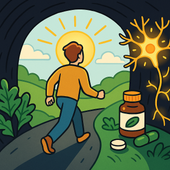
Post-Traumatic Growth and Supplements That Support It
After trauma, true healing means more than survival — it’s transformation. Learn how post-traumatic growth happens in the brain and body, and explore natural supplements like magnesium, ashwagandha, saffron, and omega-3s that support resilience, clarity, and emotional repair.
-
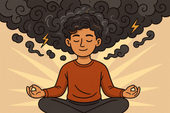
How to Regain Focus After Emotional Stress
After emotional stress, your nervous system feels frayed — your focus fades, thoughts race, and calm seems impossible. Learn how to restore balance, rebuild concentration, and retrain your brain for clarity and peace through evidence-based mind–body tools. 🌿
-
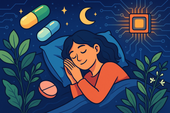
The Future of Sleep Supplements
The future of sleep supplements is here — where science meets nature. Discover how next-generation formulas use adaptogens, amino acids, and biotech innovations to support deep, restorative sleep without dependency. 🌙
-
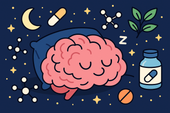
Emerging Research on Sleep and Nootropics
Can nootropics help you sleep better? Discover how compounds like L-theanine, magnesium threonate, ashwagandha, and Alpha-GPC influence neurotransmitters, circadian rhythm, and brain recovery — bridging the gap between smarter days and deeper nights. 🌙
-

New Herbal Extracts for Deep Sleep
Discover the next generation of herbal extracts for deep sleep — from saffron and magnolia to jujube and lemon balm. Learn how these plant-based compounds calm the nervous system, balance cortisol, and promote truly restorative rest. 🌙
-
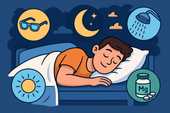
Sleep Biohacking: What Works and What Doesn’t
Biohacking your sleep can sound futuristic — from red light therapy to wearables and supplement stacks. But which hacks actually help, and which are just hype? Discover the science-backed sleep strategies that truly improve rest, recovery, and brain health. 🌙
-
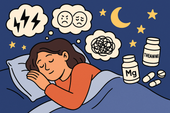
Sleep Support for People with Anxiety Disorders
💭 A restless mind can keep you up all night — thoughts spinning, heart racing, and peace feeling far away. Learn how to quiet overthinking, regulate your nervous system, and create a nightly ritual that teaches your brain to let go and rest deeply. 🌙
-
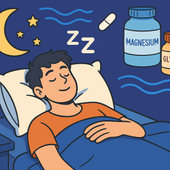
How to Fall Back Asleep After Waking Up
Waking up in the middle of the night? Learn how to fall back asleep quickly and calmly using breathing techniques, stress-reducing rituals, and natural supplements like magnesium and glycine. Restore your body’s rhythm and wake up feeling refreshed.
-
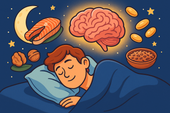
The Role of Omega-3s in Sleep Quality
-
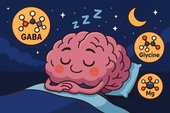
Stacking GABA and Glycine for Deeper Rest
Discover how stacking GABA and glycine can help you achieve deeper, more restorative sleep. Learn how these calming amino acids work together to relax your mind, soothe your body, and improve overall sleep quality—naturally and safely.
-

Overcoming Jet Lag with Supplements
✈️ Jet lag doesn’t have to ruin your trip! Discover how supplements like melatonin, magnesium, L-theanine, and tart cherry can help you reset your body clock faster, reduce fatigue, and recover energy naturally after long flights. 🌙
-

Managing Sleep During Times of Stress
Feeling wired and restless? Learn how to manage sleep during stressful times through nutrition, breathwork, and natural supplements like magnesium and L-theanine. Discover how to calm your nervous system and restore deep, peaceful rest—even when life feels overwhelming.
-

The Role of Magnesium for Night Cramps
Night cramps keeping you awake? Discover how magnesium helps relax muscles, balance electrolytes, and prevent painful spasms. Learn which forms work best, how to take them, and how to pair them with other nutrients for cramp-free, peaceful sleep.
-

Supplements That Reduce Nighttime Awakenings
🌙 Discover science-backed supplements that help you stay asleep through the night. From magnesium and L-theanine to glycine and ashwagandha, learn how these natural compounds calm your nervous system, balance cortisol, and prevent 2 a.m. wake-ups for deeper, more restorative rest.
-

Nootropics That Promote Calm and Rest
Explore the world of calming nootropics — natural brain enhancers that promote relaxation, better focus, and deeper rest. Learn how L-Theanine, magnesium, ashwagandha, and other adaptogens help balance your nervous system, reduce stress, and support restorative sleep.
-

Best Natural Supplement Stack for Sleep
Discover the best natural supplement stack for deep, restorative sleep. Learn how nutrients like magnesium, L-theanine, glycine, and calming herbs such as chamomile and ashwagandha work together to relax your body, calm your mind, and improve sleep quality—naturally and safely.
-

Combining L-Theanine and Magnesium for Sleep: A Calm Night, Naturally
Discover how combining L-Theanine and Magnesium can help you drift into deep, restorative sleep. Learn how this natural duo calms the mind, relaxes the body, and supports your nervous system—without grogginess the next morning.
-

How to Sleep Better After Intense Workouts
Struggling to fall asleep after a tough workout? Learn how to optimize your post-training recovery with nutrition, hydration, and science-backed sleep strategies. Discover how to calm your nervous system, balance hormones, and wake up fully recharged for your next session.
-

Ashwagandha and Valerian: A Bedtime Combo for Deep Rest and Emotional Reset
Discover the calming synergy of Ashwagandha and Valerian root, two natural sleep aids that help quiet the mind, ease anxiety, and promote deeper rest. Learn how this herbal duo supports the nervous system, balances stress hormones, and restores emotional peace — without next-day grogginess.
-

How to Create a Resilience-Boosting Diet
Discover how to build emotional and physical strength from the inside out with a resilience-boosting diet 🍎. Learn which foods stabilize your mood, how supplements like magnesium and omega-3s strengthen your stress response, and why pairing nutrition with breathwork and therapy creates lasting calm, focus, and vitality 🌿💪.
-

Best Teas and Herbal Blends for Calmness: Nature’s Way to Restore Inner Peace
Ashwagandha, the ancient adaptogenic herb, helps your body find balance during stress. Known as “Indian ginseng,” it supports cortisol regulation, boosts energy, and restores calm clarity. Discover how this powerful root promotes resilience, emotional balance, and steady vitality — one cup at a time. 🌸
-

Parenting and Emotional Strength: How to Raise Children Without Losing Yourself
Empathy is the bridge that connects hearts — the quiet power to understand, feel, and support another’s emotions without judgment. Learn how empathy strengthens relationships, enhances communication, and cultivates deeper compassion in everyday life. 🌿
-

How to Bounce Back from Public Failure: Reclaiming Confidence, Purpose, and Power
Visualization is more than imagination — it’s brain training for resilience. By picturing calm, success, or healing, you activate the same neural pathways as real experience. Learn how daily visualization rewires your brain for confidence, emotional balance, and recovery from stress. ✨
-

Coping with Financial Stress Through Resilience: How to Stay Grounded When Money Feels Tight
Body awareness is the foundation of emotional resilience. By tuning into your body’s signals — tension, fatigue, or calm — you learn to recognize stress before it overwhelms you. Discover how mindfulness, gentle movement, and breathwork can deepen your connection with your body and restore balance from the inside out. 🧘
-

How to Stay Positive During Chronic Illness: A Guide to Emotional Strength and Hope
Creativity is more than art — it’s a form of healing. Whether through painting, writing, music, or small acts of expression, creativity helps release emotion, calm the nervous system, and reconnect you to joy. Discover how to use creativity as a tool for emotional balance, resilience, and self-discovery. 🌿
-

Resilience Tips for Caregivers: How to Stay Strong While Caring for Others
Joy isn’t the absence of pain — it’s the quiet strength to find light even in challenging times. Cultivating joy through small daily moments restores balance, releases stress, and reminds you of life’s beauty. Learn how to reconnect with authentic happiness, rebuild emotional energy, and nurture your nervous system through gratitude, presence, and play. 🌿
-

Building Resilience After a Breakup: How to Heal, Rebuild, and Rise Stronger
Social connection is one of the strongest predictors of emotional resilience. During difficult times, genuine relationships act as anchors — calming the nervous system, reducing stress hormones, and helping you regain perspective. Learn how cultivating real human connection can strengthen your mind, heart, and overall well-being. 🌿
-

How to Stay Emotionally Strong During Job Loss
Your emotions are powered by brain chemistry — a delicate balance of neurotransmitters like serotonin, dopamine, and cortisol. When these chemicals work in harmony, you feel calm, focused, and resilient. Learn how daily habits, nutrition, and mindfulness can support your brain chemistry and boost emotional well-being naturally. 🌿
-

The Role of Hormones in Emotional Stability: How Your Chemistry Shapes Your Calm
Hormones shape more than your body — they shape your emotions, resilience, and sense of calm. From cortisol to serotonin, these chemical messengers influence how you react to stress, connect with others, and recover from challenges. Learn how to balance your hormones naturally to build lasting emotional stability and harmony within. 💫
-

Mitochondria and Emotional Energy: The Cellular Power Behind Your Mood
Breathwork is one of the most powerful tools for emotional regulation and cellular balance. Through intentional breathing, you can calm your nervous system, increase oxygen flow to the brain, and even support mitochondrial energy. Learn how conscious breathing connects body and mind — transforming stress into presence and emotional strength. 🌿
-

Inflammation and Its Impact on Mood Resilience: The Silent Link Between Body and Mind
Inflammation doesn’t just affect the body — it impacts the mind. Chronic inflammation alters brain chemistry, depletes serotonin, and makes emotional recovery harder. Learn how calming inflammation through nutrition, mindfulness, and sleep can restore balance, resilience, and a renewed sense of emotional strength. 💫
-

How Antioxidants Protect Emotional Well-being: The Hidden Link Between Oxidative Stress and Mental Health
Antioxidants do more than protect your body — they defend your mind. By neutralizing oxidative stress, antioxidants support serotonin, dopamine, and brain energy pathways that keep you calm, focused, and emotionally balanced. Discover how foods like berries, green tea, and dark chocolate nourish your brain, boost mood, and strengthen resilience from the inside out. 🌿✨
-

The HPA Axis and Emotional Health: The Hidden Bridge Between Stress and Mind
Neuroplasticity — the brain’s ability to rewire and adapt — is the foundation of emotional healing and resilience. When you face stress, trauma, or change, your neural pathways can reshape themselves to support new patterns of calm, focus, and self-awareness. Learn how daily practices like mindfulness, therapy, and breathwork strengthen neuroplasticity to transform emotional pain into personal growth. 🌸
-

Why Cortisol Control Is Key to Resilience: Mastering Stress to Build Emotional Strength
Controlling cortisol — the body’s main stress hormone — is the secret to lasting resilience. When cortisol levels stay balanced, your mind becomes clearer, emotions steadier, and energy more sustainable. Learn how breathwork, mindset shifts, adaptogens, and daily rhythms can help you calm your stress response and build true inner strength. 🌞💪
-

Dopamine’s Influence on Motivation and Recovery: Reigniting Drive and Balance
Healthy relationships are the foundation of emotional balance and resilience. Whether romantic, familial, or platonic, genuine connection releases dopamine, serotonin, and oxytocin — the brain’s “bonding trio” — helping us feel secure, motivated, and seen. Learn how trust, empathy, and communication not only strengthen your connections but also reshape your nervous system for deeper emotional well-being. 🌿🤝
-

The Role of Serotonin in Resilience: How This “Mood Molecule” Shapes Emotional Strength
Serotonin — often called the “resilience molecule” — plays a vital role in how we handle stress, regulate mood, and recover from emotional challenges. Beyond happiness, this powerful neurotransmitter helps balance the gut-brain axis, stabilize the nervous system, and support emotional flexibility. Learn how nutrition, sunlight, mindfulness, and adaptogens can naturally boost serotonin and strengthen your emotional resilience. 🌞🧠
-

How Neuroplasticity Supports Emotional Growth: Rewiring the Brain for Resilience
Neuroplasticity is the brain’s built-in power to grow, adapt, and heal — and it’s the foundation of emotional transformation. Every mindful breath, compassionate act, or reframed thought strengthens new neural pathways that support resilience and self-awareness. Learn how your brain rewires through daily habits, helping you turn emotional challenges into opportunities for growth and calm. 🌿
-

Tai Chi and Adaptogens for Mind-Body Balance: The Art of Harmonizing Energy and Resilience
Alchemy isn’t just an ancient science — it’s a timeless symbol of transformation and inner balance. By blending the physical and spiritual, alchemy teaches us that change begins from within. Just as metals are refined into gold, we too can transmute emotional pain, stress, and chaos into clarity and strength through mindful practice and self-awareness. 🌙✨
-

Cold Therapy and Emotional Control: Training the Mind Through the Body
Cold therapy isn’t just for athletes — it’s a tool for emotional mastery. By exposing your body to controlled cold, you train your nervous system to stay calm under stress, improving focus, mood, and resilience. This article explores the science of cold exposure, its impact on hormones and the vagus nerve, and how ice baths and cold showers can help you build emotional control, one breath at a time. 🧊🧘♂️
-

How Music Influences Emotional Recovery: The Healing Soundtrack of the Mind
Neuroplasticity — the brain’s ability to rewire and heal itself — is at the heart of emotional recovery. Through mindful habits, music, therapy, and consistent mental stimulation, your brain can form new connections that support resilience and well-being. Discover how neuroplasticity turns pain into growth, helping you rebuild balance, focus, and emotional strength. 🌿
-

Nature Therapy for Building Resilience: Reconnecting With the Healing Power of the Earth
Nature therapy helps rebuild emotional resilience by reconnecting you with the healing rhythms of the Earth. From forest walks to sunlight exposure, nature restores balance to your nervous system, lowers stress hormones, and teaches emotional adaptability. Learn how spending time outdoors can enhance mental clarity, calm anxiety, and awaken your natural capacity to heal. 🌞
-

Breathwork Techniques That Pair with Supplements: The Ultimate Synergy for Stress Relief and Mental Clarity
Breathwork and supplements create a powerful mind-body synergy for stress relief, focus, and energy. By combining intentional breathing with adaptogens, nootropics, and calming nutrients, you can naturally regulate cortisol, sharpen mental clarity, and boost emotional balance. This guide explores the best breathwork techniques and supplement pairings to help you feel centered, calm, and energized from the inside out. 🌿


















































